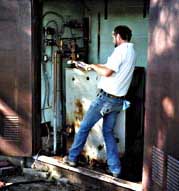
“This is a close-knit community, and a lot of people are on a first-name basis,” Messenger said. “I’ve been in the local Wal-Mart and someone has said, ‘Look, there is my furnace man.’”
On this late September morning, Messenger was scheduled to visit a mobile home customer who had no heat and tear out a boiler at a local church. Both jobs were located in Kenton, a few miles south of the shop in Dunkirk.
As he drove to the first stop, Messenger talked about servicing customers whose homes and businesses are spread out geographically.
“Some days we might put on 100 to 150 miles for only a few stops,” he said. “I’d prefer to schedule all of my stops in the same area, like here in Kenton today. My van is a few years old and I’m at about 75,000 miles.”
Travel time is usually included in the price; and if a customer buys an Aire Serv Comfort Protection Plan (CPP), the travel cost is already figured in. Flat-rate pricing is another Aire Serv product that Messenger likes.
“It’s nice to be able to give a customer a price for a replacement on the spot,” he said. “I like leaving the customer’s home with a signed contract.”
Messenger said his company does a lot of work in mobile homes because other HVACR companies can’t or won’t do the work. And there are other things that competitors won’t do.
“We service a few fuel oil furnaces and some companies don’t want that work,” he said. “I’ll try and schedule as many of these as I can at the same time. The fuel oil smell is nasty.”

“Around here, most of the [HVACR] workers learn from the field,” he said.
There is a votech school that teaches HVACR in Lima (30 miles east). The Aire Serv/JBS techs are all required to take and pass the EPA certification exam.
He added that technicians take required training from nearby Hancock County each year, too.
“We compete with some moonlighters around here,” Messenger noted.
That is one of Aire Serv/JBS owner John Gerlach’s biggest bugaboos — unlicensed people buying and installing equipment. “There is no way that a company should be selling equipment to a person who isn’t licensed to install it,” Gerlach said.

SERVICE CALLS
The first stop at a customer’s mobile home resulted in the need to replace a bad gas valve. Messenger knew the customer and explained the problem, telling her she “might want to sit down” when she heard the cost of replacing it. But she consulted with her landlord, who was paying the bill anyway, and the decision was made to proceed with the service.Because Messenger was well prepared, he had the replacement gas valve on the truck. But he didn’t have the procedure listed in his flat-rate book. He called it in and got the price of the part and labor. Since the customer wasn’t paying the bill, Messenger said his company would bill the mobile home owner. Within an hour, he was done and on his way.
The next stop was to check on the progress of a boiler replacement at the Grace Evangelical Lutheran Church in downtown Kenton. Greg Hall and his assistant, Chris Atha, were working on the job, which was scheduled to take 2-1/2 days. Atha worked inside replacing the thermostats while Hall began working on tearing down the boiler for removal. His task was complicated by the size of the boiler and the fact that an inner wall, erected after the boiler was installed, made accessibility a little more difficult.
He started to dismantle the old boiler while Dave Mullett, another helper, prepared to load the pieces on his truck for disposal. A new, smaller-envelope Bryant boiler was on a pallet back at the shop, awaiting delivery to the church.
Messenger left with a few instructions, and he headed back to the shop. On the way back, he talked about some of the new procedures that Aire Serv has put into place, like requiring technicians to wear a picture I.D., put booties on their shoes, and put floor mats down before entering a home.
“It’s taking a while to get used to these new things, but I think you have to do them to make yourself better than the other guys,” he said.
Later in the day, Gerlach conducted a tour of another large commercial job his company was working on in nearby Upper Sandusky. The owner of a bingo hall was doubling the size of his business with a 6,000-square-foot addition. Aire Serv/JBS got the job of installing two side-by-side Trane 12-1/2-ton AHUs on the ground outside of the building. The lightweight corrugated roof would be inadequate for a rooftop installation. Gerlach said his company was also adding the ductwork and eight “smoke eaters” to filter the smoky air.
Publication date: 10/14/2002



